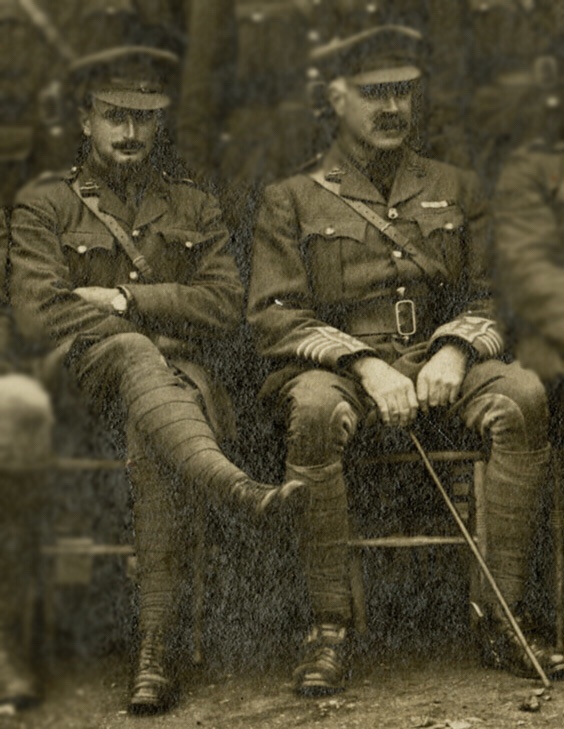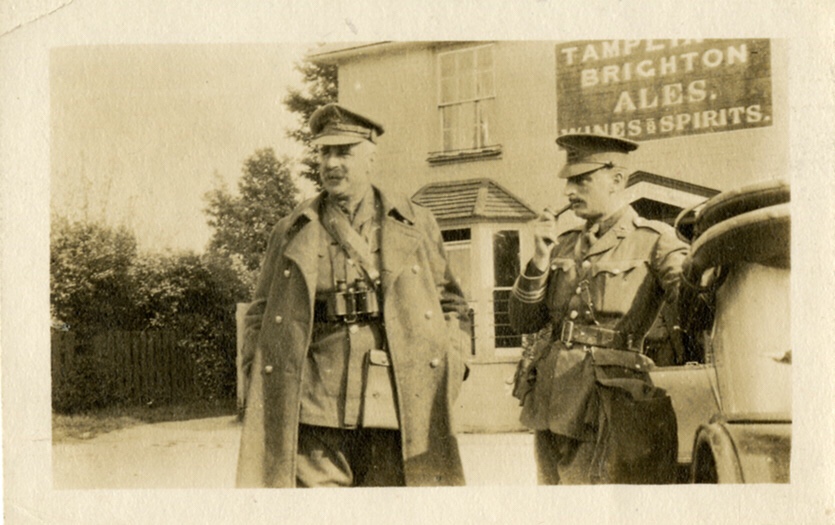One hundred years ago today Jack Peirs was promoted to Acting Lieutenant-Colonel of the 8th Queen’s. For Peirs, this promotion was a long time coming. He had dutifully served as the second-in-command of the battalion for nearly three years at the front. However, overlooked in the Peirs story, particularly on our site, is the role of the other commanders of the 8th Queen’s, men who helped prepare Peirs for this moment. As Peirs rose in rank and responsibility, he learned from two other officers how to be a battalion commander.
The 8th Queen’s was first commanded by a career Army officer ‘dug out’ of retirement. At the start of the war, there was a shortage of senior officers to lead New Army battalions. The War Office relied on retired officers to command many New Army battalions. Some were capable; others were not. It was fortunate for the 8th Queen’s that they had a good first Commanding Officer (CO) who proved inspirational for the men as they trained in England before their embarkation to France. This officer was Lieutenant-Colonel Frederick Howard Fairtlough, CMG.

Peirs and Fairtlough in 1915.
Fairtlough had a typical story for a pre-war senior officer. He commanded the 3rd Battalion of the Queen’s in the Boer War and he had experience training and commanding the militia in peacetime. In 1914, Fairtlough was a fifty-four-year-old experienced commander who had dedicated most of his adult life to the regiment. He was a natural choice to command a service battalion and to train this group of raw recruits.
It was Fairtlough who recognized Peirs’s talent and came to rely on him as his second-in-command of the battalion. The two knew each other before the war as Peirs had been one of his junior officers in the 3rd Battalion making him one of the few men in the officer’s mess with any military experience. Peirs had a high opinion of the ‘old chap’ but he was concerned about his ability to bear the strain of the war, no doubt in light of his age. In one of his early letters from the front, 17 September 1915, Peirs wrote to his family:
I get some revolver practice most days & am becoming quite a fair shot with both hands. I go out with the C.O. & the poor old chap gets very annoyed, as he used to be a good shot (so he says) but he cant hit a hay-stack now. He gets so awfully nervous & rattled nowadays that Lord only knows what he will be like when we get further up. I suppose it will be my job to keep him soothed, though I don’t fancy it very much.
If Peirs is to be believed here, the pressures of command were wearing on the colonel. This is an important insight because the battalion was only one week away from their arduous march to Loos where they would see action. In that engagement – the battalion’s first disastrous bloodletting – Fairtlough was killed leaving Peirs in command of a broken battalion.

A candid shot of Fairtlough (left) and his trusted subordinate Peirs (smoking jauntily) upon their embarkation to France, August 1915.
Why wasn’t Peirs promoted to battalion command after the death of his CO at Loos? Peirs had only been at the front for a month after training in England for nearly a year. His only pre-war experience was as a subaltern, a junior officer in peacetime, so he was not prepared for senior command. What leadership traits Peirs demonstrated at Loos – coolness under fire, courage, and emotional resiliency in the face of incredible tragedy – were characteristics that made for a certainly brave officer, but in order to be an effective CO of a battalion, Peirs would have to learn how to command.
In November 1915, Lt Col Archibald Montgomery Tringham, DSO, joined the battalion as their new CO. The new colonel was forty-six years old and had extensive colonial military experience in Malta, South Africa, and India. Initially, Peirs was pleased with his selection, but a few days into his command, he worried that the new officer might be too much of a regular army man for the citizen soldiers of the 8th Queen’s:
He is a very strict disciplinarian & I am afraid will be rather too much so, as the old sort of discipline is to my mind not required by the new army, or any how not by our men. They have got enough to put up with without bothering them with small details. However we shall see how he goes on.
Despite his reservations, Tringham proved a able commander who grew to trust his second-in-command. Peirs no doubt learned a great deal about what it was to command a battalion from him during the crucial years of 1916-1917, when the army was learning new tactics and adapting to the changing war on the western front at the Somme and Third Ypres. In both campaigns, Tringham commanded the battalion while Peirs gained combat experience, took over temporary command while he was on leave, and earned decorations for bravery, the latter of which were recommended by his CO.
As the need for experienced senior officers continued to grow, Tringham frequently was pulled out of his battalion for temporary brigade command. In the winter of 1917-1918, it was clear that he would not be in command of the 8th for much longer and Peirs was sent to senior officer’s school, where he was issued a glowing report recommending him for immediate battalion command. When he returned to the front in February 1918, he assumed command of his old battalion and led it through the harrowing first few days of the Spring Offensive before being wounded and invalided back home. When he was promoted one-hundred years ago today, Peirs was back in action as the CO of the Queen’s.
So, it was not so much that Peirs was passed over, but that the 8th had two experienced and good commanders who were able to lead the battalion and give Peirs the essential experience he needed to be an effective combat commander. As Fairtlough initially trained the battalion and Tringham helped to rebuild it after Loos, these men then gave Peirs opportunities to gain experience and earn distinction in his subordinate role. Peirs led his men in raids and attacks and became comfortable with the routine clerical work of a commander. By the time he got to senior officer training school, he already knew the job and had vast tactical experience. He breezed through his schooling and then went straight into the field and earned further distinction in battle because he knew the job from his training under two older officers who recognized and rewarded his talents.
